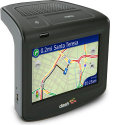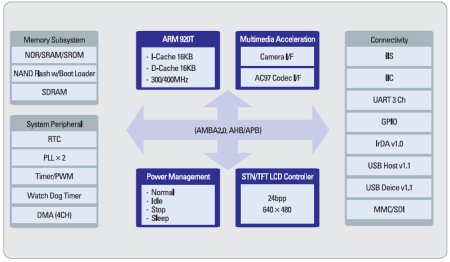Navigation device uses Linux phone platform
Jan 4, 2008 — by Eric Brown — from the LinuxDevices Archive — 5 views [Updated Sep. 16] — A Sunnyvale, Calif.-based start-up announced a WiFi- and GPRS/GSM-equipped navigation device based on a newly upgraded Linux-based mobile phone platform. Dash Navigation's “Dash Express” borrows both hardware and software components from OpenMoko's forthcoming Neo FreeRunner mobile phone, and… boasts continual two-way Internet communications.
[Updated Sep. 16] — A Sunnyvale, Calif.-based start-up announced a WiFi- and GPRS/GSM-equipped navigation device based on a newly upgraded Linux-based mobile phone platform. Dash Navigation's “Dash Express” borrows both hardware and software components from OpenMoko's forthcoming Neo FreeRunner mobile phone, and… boasts continual two-way Internet communications.
(Click for larger view of the Dash Express)
The Dash Express is positioned as the first in-car navigation device to feature a continuous connection to the Internet. The Dash network monitors available wireless options and chooses the best pick between cellular radio and WiFi to download traffic data, map updates, and other information from the Internet. The always-connected architecture enables an interesting “user-influenced” traffic monitoring system, in which Dash computers anonymously transmit location information to the Dash network, which can advise drivers of best routes, the company says.
 Neo FreeRunner (Click for details) |
The Dash Express is based on the Neo FreeRunner design (pictured at right) that OpenMoko unveiled yesterday. The FreeRunner updates OpenMoko's original Neo1973 — one of the very first Linux-based phones to feature a user-replaceable OS — with a faster processor, new 3D graphics acceleration, WiFi, 850MHz triband GSM capability, and 3D accelerometers.
Dash Express uses the Neo FreeRunner's hardware design minus the 3D graphics acceleration, accelerometers, and Bluetooth, and adds 3GB of flash storage (instead of 256MB), as well as a stronger GPS receiver and larger antenna. The navigation device also borrows the open source Linux kernel and bootloader maintained by OpenMoko.org, a community effort to build a mobile phone entirely from open source software. However, despite its close relation to OpenMoko, the Dash Express is not designed to run user-modified Linux stacks.
CTO Bob Curry explained, “We can upgrade the OS over-the-air, but unlike the Neo phone, the Dash Express is not designed for hacking.”
Both the Dash Express and the Neo FreeRunner will be manufactured by OpenMoko's former parent company, First International Computer (FIC) — one of the world's largest consumer electronics and PC manufacturers — and both will be demonstrated by OpenMoko at next week's CES (Consumer Electronics Show) in Las Vegas.
 Dash Express navigation screen (Click to enlarge) |
Touted Dash Express features include:
- Two-way Internet access via WiFi or cellular communication
- Navigation and mapping features
- Unlimited Yahoo! local search
- Traffic routing system combines data from traditional traffic sources with anonymously gathered traffic information from other Dash-connected drivers
- Routing service provides up to three options to each requested destination based on flow patterns rather than incident data
- Service is claimed capable of automatically alerting drivers when a faster route becomes available

Samsung S3C2442 block diagram
(Click to enlarge)
The Dash Express is equipped with the same Samsung S3C2442 SoC (system-on-chip) as the Neo FreeRunner. Aside from the larger, dash-hugging case, the Dash Express is very similar to the FreeRunner. Even the display is the same size.
Here are some specs for the Dash Express:
- Processor — Samsung S3C2442 (400MHz)
- RAM — 128MB
- Flash — 3GB
- Display — 4.3-inch diagonal WQVGA Color TFT LCD 480 x 272
- Audio — “high-quality” audio codec
- USB — 1 x version 1.1
- Cellular — tri-band (900MHz) 2.5G GPRS/GSM with SIM card locked in the case
- WiFi — 802.11b/g
- GPS
- Battery — Rechargeable lithium-ion with up to two-hour battery life
- Dimensions — 4.8 x 4.1 x 2.8 inches (122 x 104 x 71 mm)
- Weight — 13.3 ounces (377 grams)
On the software side, the device uses Qt for Linux (formerly Qt Core, formerly Qt/Embedded), according to Froglogic, a vendor of automated testing tools for Qt. Froglogic says Dash used its “Squish” testing framework to test its Qt-based GUI.
Availability
The Dash Express is due to ship in February, says Dash, but is now available for pre-order here. The $600 price is said to include three free months of the $10/month Dash service.
This article was originally published on LinuxDevices.com and has been donated to the open source community by QuinStreet Inc. Please visit LinuxToday.com for up-to-date news and articles about Linux and open source.